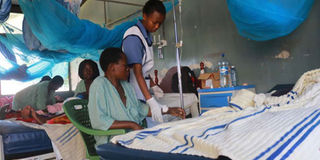To have universal healthcare, first ensure capacity building

A medical student attends to a patient at Siaya County Hospital on March 8, 2018. The more money NHIF collects, the more generous one expects the cover package to be. PHOTO | FILE | NATION MEDIA GROUP
What you need to know:
- Staff selection to attend training is not objective and rarely serves the purpose of capacity development for skills enhancement.
- For counties to achieve UHC and maximise health outcomes, investments in capacity building will need to be objective.
According to the World Health Organization, universal health coverage (UHC) is achieved when all people can obtain the health services they need without suffering financial hardship.
This means that all can access effective promotive, preventive, curative, rehabilitative and palliative health services that they need, of sufficient quality, without undergoing financial strain.
Capacity building is the process by which individuals and organisations obtain, improve and retain the skills and knowledge needed to do their jobs competently.
It relates to human resources, institutional and infrastructural capability, networks and partnerships.
The two priorities of health human resources are training and skills development; whereas solid institutional and infrastructural capacities ensure functional efficient health systems that support delivery of UHC for sustainable health outcomes.
CHALLENGES
In Kenya, the various training institutions release workforce to the health sector every year.
For the health sector, innovations and research inform clinical practices and policies, hence the need for continuous updates for workers.
Health managers and planners agree that capacity building is crucial in the development of the necessary structures and systems as well as competencies and capabilities for personnel to deliver health services.
However, the approach to capacity building is unstructured and coupled with challenges, rendering its purpose ineffective and intentions unachieved.
Additionally, most of the capacity building in Kenya is donor-supported and -driven; serving programmatic needs to deliver specified health indicators; hence, lacking the right mix in diversity to suit all healthcare workers.
PER DIEM
Staff selection to attend training is not objective and rarely serves the purpose of capacity development for skills enhancement.
It’s often the preserve or reward for loyalty and a source of extra income for senior managers.
Most senior staff grab every opportunity for training to nominate themselves or their cronies and earn an extra income through allowances or per diem — at the expense of targeted staff who perform the relevant roles and need the skills to improve services.
In many public health facilities, most of the training is programme donor-driven and, as such, tailored to respond to specified service delivery outcomes or indicators.
The focus therefore is on clinical staff — nurses, clinical officers and pharmacy and laboratory staff, disregarding other essential cadres.
PUBLIC HOSPITALS
For instance, cross infections can be significantly minimised and hospitalisation stay shortened with investment in training of support staff and cleaners responsible for sanitation and waste management for infection prevention among patients, staff and communities.
Companies and organisations in the hospitality industry — including hotels and private hospitals — for instance, invest heavily to ensure customer satisfaction and enhance their experience so as to attract referrals and return visits.
But clients at most public hospitals, including some faith-based and private ones, are not only mistreated but have horrific traumatic experiences, seeking services there out of lack of options.
This needs to change. Intentional investments in customer care and public relations training for all staff — both those with direct and indirect contact with patients.
DONORS
Donors and partners support a big percentage of Kenya’s health services.
The sector is devolved; so, counties are at liberty to engage donors in partnerships for direct funding for health services.
But donors have shied away from such initiatives, citing lack of transparency in financial accounting, operational and management systems.
Building strong governance, leadership and management structures to support smooth operations gives the necessary oversight in decision-making, control, resources planning and direction in managing health services.
TRAINING
This needs to be intentional, focused and enhanced through capacity building to tap into local and international partnerships in financing for UHC.
Additionally, for counties to achieve UHC and maximise health outcomes, investments in capacity building will need to be objective, holistic and sustained for health systems and efficiency of structures.
The training needs to be structured, holistic and targeting all staff in every hospital department — clinical and non-clinical — and should responsive to challenges facing the health institution.
Ms Njue is capacity building manager at Mission for Essential Drugs (Meds). [email protected]



